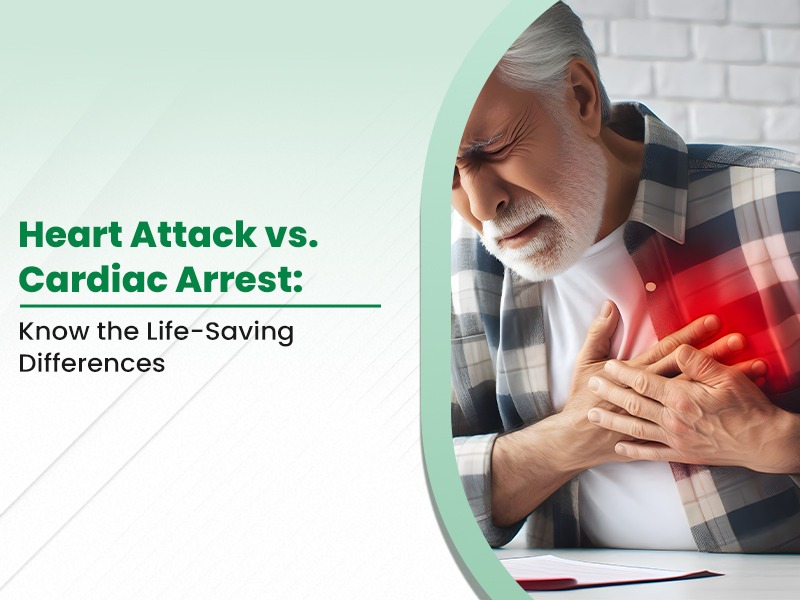
Heart Attack vs. Cardiac Arrest: Know the Life-Saving Differences
When it comes to heart health, two terms that are often confused are heart attack and cardiac arrest. Both are serious medical emergencies, but they are not the same. While many people use the terms interchangeably, understanding the difference could one day help save a life. Both conditions require immediate attention, but they have different causes, distinct symptoms, and may require different treatment approaches.
What Is a Heart Attack?
A heart attack, also called a myocardial infarction, occurs when blood flow to a part of the heart is blocked. This blockage is usually caused by a blood clot in the narrowed coronary arteries, preventing oxygen-rich blood from reaching the heart muscle and causing tissue damage. Heart attacks are often linked to coronary artery disease, and immediate medical attention is crucial to save as much heart tissue as possible.
Common Symptoms of a Heart Attack
- Persistent chest pain or pressure
- Discomfort spreading to the arms, back, neck, or jaw
- Shortness of breath
- Cold sweats or dizziness
If you notice these warning signs, it is critical to seek emergency care at a trusted heart hospital in Ghaziabad. With advanced facilities and skilled cardiac teams, such hospitals can provide life-saving treatments like angioplasty or clot-busting medications to restore blood flow quickly.
What Is Cardiac Arrest?
Cardiac arrest is not the same thing as a heart attack. It occurs when the heart stops beating suddenly due to an electrical problem. If this happens, the heart is unable to circulate blood to the brain, lungs, and other organs. Cardiac arrest can be fatal within minutes without treatment. In contrast to a heart attack (which can happen gradually), cardiac arrest can occur suddenly without warning.
Common Signs of Cardiac Arrest
- Sudden collapse
- Loss of consciousness
- No pulse or breathing
In these situations, applying cardiopulmonary resuscitation (CPR) and using an automated external defibrillator (AED) can save lives. Rapid transfer to a site with emergency response systems, such as a heart hospital, Ghaziabad, ensures that patients will receive immediate intervention and evaluation that could be life-saving.
How Are They Connected?
Although distinct, cardiac arrest and heart attacks can be connected. A serious heart attack can occasionally lead to a cardiac arrest event if a large portion of the heart has been damaged. This is exactly why anyone with a history of heart disease needs to be cautious and have regular health care evaluations. A prompt visit or advice from the best cardiologist in Ghaziabad would help cost-effectively identify risk factors and address them so that future events would be prevented.
Diagnosis and Treatment Approaches
To confirm if there are blockages causing heart attacks, medical professionals perform several tests, including ECG measurements, blood tests, and imaging studies. Treatment occasionally involves angioplasty or stent placement, and medications to dissolve identified clots and relieve the heart’s hypertension. In contrast, cardiac arrest is an emergency condition requiring immediate resuscitation and defibrillation, followed by intensive care to stabilise the patient.
The right specialised care with the best cardiologist in Delhi NCR is important for evaluating underlying causes and helping to demonstrate long-term treatment plans. Whether it is intervention that is surgical or management that is preventative, great cardiologists ensure patients receive care that is distinctively personal to their situation.
Prevention: The Key to Heart Health
Prevention continues to be the most effective against heart attacks and cardiac arrest. Adjustments to your lifestyle that include eating appropriately, exercising, quitting smoking, and reducing stress are all necessary steps towards a heart-healthy life. Getting a regular medical check-up can identify problems early and help prevent emergencies later on. While assessing a person’s cardiovascular risk, seeing the best cardiologist in Ghaziabad can educate patients about their individual risk factors and create a prevention and care plan to be proactive.
For those patients with established problems such as hypertension, diabetes, or cholesterol, getting an evaluation or some advice from the best cardiologist in Delhi NCR may lessen the risk of a complication down the road. Living a heart-healthy lifestyle will not only save your life but also improve your quality of life in all aspects for years to come.
Conclusion
Although both heart attacks and cardiac arrests are serious medical emergencies, they are different conditions. A heart attack is caused by blocked blood flow, while a cardiac arrest is when the heart suddenly stops beating. Knowing the differences and acting fast can help save lives. Having access to a reputable heart hospital in Ghaziabad, followed by quality care with one of the best cardiologists in Ghaziabad, or the best cardiologist in Delhi NCR, will give anyone the best chance for care in an emergency.
You can protect yourself and your loved ones by staying aware, taking preventive measures, and seeking timely medical care. Staying informed will allow you to take proactive measures to protect the health of yourself and your loved ones.
